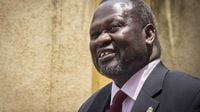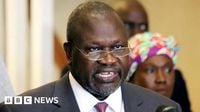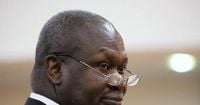South Sudan, the world’s youngest nation, is once again at a political crossroads after its First Vice President, Riek Machar, was charged with murder, treason, terrorism, and crimes against humanity. The charges, announced on September 11, 2025, stem from a brutal militia attack in March that killed more than 250 government soldiers in the northeastern town of Nasir. The attack, reportedly carried out by the White Army—a militia largely composed of youths from Machar’s own Nuer ethnic group—has reignited fears of a return to the devastating civil war that tore the country apart just a few years ago.
The Justice Minister, Joseph Geng Akech, did not mince words when he briefed reporters in Juba. “This case sends a clear message: those who commit atrocities against the people of South Sudan, against our armed forces, and against humanitarian personnel will be held accountable, no matter their position or political influence,” he declared, according to Bloomberg. The minister detailed that the crimes included gross violations of the Geneva Conventions and international humanitarian law, such as the desecration of corpses, attacks on humanitarian workers, and the persecution of civilians. A United Nations helicopter was even fired upon during the chaos, resulting in the death of its pilot, as reported by BBC and France 24.
Machar, who has been under house arrest since March, was accused of organizing the revolt and working with militia troops. The roads to his residence in the capital, Juba, have been blocked by tanks and armed soldiers, signaling the gravity of the situation and the government’s determination to prevent any escalation. Alongside Machar, seven other senior officials—including Petroleum Minister Puot Kang Chol and Army Deputy Chief of Staff Lt Gen Gabriel Duop Lam—have been charged and remain in detention. Another 13 suspects are still at large, according to Reuters and BBC.
The government’s accusations are serious: Machar and his allies are said to have orchestrated the March attack through “coordinated military and political structures,” as the justice ministry put it in a statement reported by the Associated Press. The White Army’s assault on the army base in Nasir was especially deadly, with the loss of a general and hundreds of soldiers. The justice ministry claims Machar and his co-accused “have been informed of the charges against them and their constitutional rights.” However, the precise details of Machar’s legal situation remain unclear, and it is not known when he will appear in court.
The charges have deepened an already tense rivalry between Machar and President Salva Kiir, whose power struggle has defined South Sudanese politics for decades. Both men were historical leaders of the Sudan People’s Liberation Movement (SPLM), the rebel group that fought for South Sudan’s independence from Sudan in 2011. But their alliance has always been uneasy. Kiir is from the Dinka, South Sudan’s largest ethnic group, while Machar is Nuer. Their military rivalry dates back to the 1990s, when Machar led a breakaway faction, leading to accusations of betrayal and atrocities that sowed lifelong distrust between the two leaders.
That distrust exploded into violence in 2013, when Kiir fired Machar as vice president, accusing him of plotting a coup. The resulting civil war was catastrophic: an estimated 400,000 people were killed, and roughly four million—about a third of the population—were displaced. The conflict was marked by ethnic massacres, widespread human rights abuses, and the near-collapse of the country’s fledgling institutions, as recounted by France 24 and AP.
After years of bloodshed, a 2018 peace agreement saw Kiir and Machar form a government of national unity. Yet the deal was always fragile. Trust between the two camps was in short supply, and violence never truly ceased. The agreement’s implementation has been slow, with presidential elections repeatedly postponed and key provisions left unfulfilled. According to Reuters, the recent move to prosecute Machar threatens to unravel what little progress has been made, risking a slide back into open conflict.
The international community is watching with alarm. The United Nations, African Union, and neighboring countries have all called for calm and dialogue, warning that Machar’s detention and prosecution could destabilize the country and violate the spirit of the 2018 peace deal. “International powers and regional mediators have repeatedly urged for Machar’s release, claiming that his arrest breaches the spirit of the 2018 peace agreement and risks plunging South Sudan back into civil conflict,” Reuters reported. Civic leaders, too, have voiced concern: Edmund Yakani, a prominent South Sudanese activist, insisted that the suspects should be brought before a competent and independent court, not what he called “a kangaroo court of law,” as quoted by AP.
For Machar’s supporters, the charges are nothing more than a political witch hunt. His spokesman, Puok Both Baluang, told AP that “the charges constitute a political witch hunt” and accused the justice system of lacking independence and being subject to political manipulation. Machar himself has not commented publicly on the allegations.
President Kiir, meanwhile, has moved quickly to consolidate his position. He suspended Machar from his role as First Vice President on the same day the charges were announced, a decision broadcast on state radio. The president also suspended Petroleum Minister Puot Kang Chol, further weakening Machar’s political base within the government. According to multiple sources, including BBC and Bloomberg, a total of 21 individuals have been indicted in connection with the case, with eight in detention and 13 at large.
The stakes could hardly be higher. South Sudan, after gaining independence with such hope in 2011, has struggled to find peace and stability. The country’s economy is in tatters, cycles of violence persist, and millions remain displaced. The specter of a renewed civil war looms large, especially as ethnic tensions between Dinka and Nuer communities remain unresolved.
As the judicial process unfolds, the world will be watching to see whether South Sudan can navigate this crisis without sliding back into chaos. The outcome will determine not only the fate of Riek Machar and his allies but also the future of a nation still struggling to escape its violent past.



